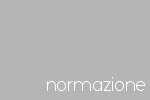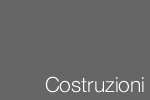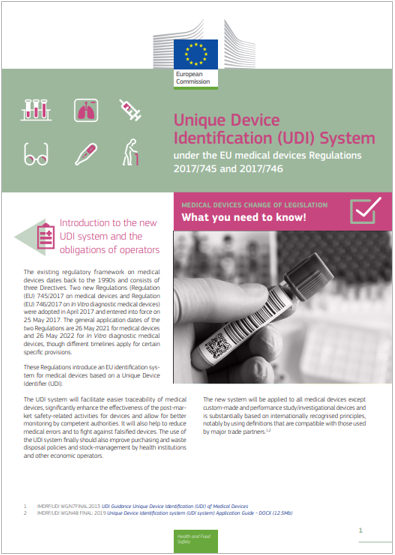Faq Unique Device Identification (UDI) System
EC, 11.08.2020
The existing regulatory framework on medical devices dates back to the 1990s and consists of three Directives. Two new Regulations (Regulation (EU) 745/2017 on medical devices and Regulation (EU) 746/2017 on In Vitro diagnostic medical devices) were adopted in April 2017 and entered into force on 25 May 2017. The general application dates of the two Regulations are 26 May 2021 for medical devices and 26 May 2022 for In Vitro diagnostic medical devices, though different timelines apply for certain specific provisions.
These Regulations introduce an EU identification system for medical devices based on a Unique Device Identifier (UDI).
The UDI system will facilitate easier traceability of medical devices, significantly enhance the effectiveness of the post-market safety-related activities for devices and allow for better monitoring by competent authorities. It will also help to reduce medical errors and to fight against falsified devices. The use of the UDI system finally should also improve purchasing and waste disposal policies and stock-management by health institutions and other economic operators.
The new system will be applied to all medical devices except custom-made and performance study/investigational devices and is substantially based on internationally recognised principles, notably by using definitions that are compatible with those used by major trade partners
Article 27 of Regulation (EU) 2017/745 (‘MDR’) and Article 24 of Regulation (EU) 2017/746 (‘IVDR’) lay down that the UDI system shall consist of:
b. the placing of the UDI carrier on the label of the device or on its packaging or in case of reusable devices on the device itself (direct marking);
c. the storage of the UDI by economic operators, health institutions and healthcare professionals, in accordance with the conditions laid down in paragraphs 8 and 9, respectively, of the Articles;
d. the establishment of an electronic database for Unique Device Identification (the ‘UDI database’), which is part of the Eudamed database, in accordance with Article 28 of MDR and Article 25 of IVDR.
In accordance with the new rules, any manufacturer shall thus assign a unique UDI to a device and to all higher levels of packaging before placing that device on the market except custom-made medical devices and performance study/investigational devices.
The UDI carrier shall be placed on the label of the device and on all higher levels of packaging and in case of reusable devices on the device itself (direct marking). The manufacturer shall also ensure that the information – related to the device in question - referred to in Part B and Part A, Section 2, of Annex VI of the relevant Regulation, is correctly submitted to the European Database on Medical Devices (Eudamed) as required by Article 27(3) of MDR and Article 24(3) of IVDR. The manufacturer shall also maintain unique UDIs for its devices.
NOTE: Timelines related to those obligations are indicated under question 6 of this document.
Within the EU, the manufacturer shall assign to their devices, together with a UDI, also a Basic UDI-DI, which is not yet required by other jurisdictions. The Basic UDI-DI is the main key in Eudamed and relevant documentation (e.g. certificates, declaration of conformity, technical documentation and summary of safety and clinical performance) and will also be the access key for device-related information entered in the database.
UDI issuing entities designated by the European Commission operate a system for the assignment of UDI in the EU
The UDI is a series of numeric or alphanumeric characters that is created through a globally accepted device identification and coding standard. It allows the unambiguous identification of a specific medical device on the market. The UDI is comprised of the UDI-DI and UDI-PI. The unique identifier may include information on the lot or serial number and be able to be applied anywhere in the world.
The production of a UDI comprises the following:
• A UDI device identifier (‘UDI-DI’) specific to a device, providing access to the information laid down in Part B of Annex VI.
• A UDI production identifier (‘UDI-PI’) that identifies the unit of device production and if applicable the packaged devices, as specified in Part C of Annex VI.
2. What is the Basic UDI-DI?
The Basic UDI-DI is the main access key for device-related information in the Eudamed database and it is referenced in relevant documentation [e.g. certificates (including certificate of free sale), EU declaration of conformity, technical documentation and summary of safety and (clinical) performance)].
It is intended to identify and connect devices with the same intended purpose, risk class and essential design and manufacturing characteristics.
It is independent/separate from the packaging/labelling of the device and it does not appear on any trade item.
Any Basic UDI-DI shall identify the devices (group) covered by that Basic UDI-DI in a unique manner.
MDCG 2018-1 v3 guidance provides additional information on Basic UDI-DI.
3. Which products are subject to the UDI system?
The UDI system should apply to all devices, except custom-made and performance study/investigational devices.
4. Who is responsible for placing the UDI carrier on the device itself, on the label and on the package of a device?
The manufacturer is responsible for complying with all UDI related requirements. This includes the assignment of the UDI (and Basic UDI-DI), the UDI (and Basic UDI-DI) registration in the Eudamed database and the placement of the UDI carrier on the label of the device or on its packaging or, in case of reusable devices, on the device itself (direct marking).
4.1 What happens in the case of Article 16 of the MDR and IVDR? Which obligations do economic operators have regarding UDI when assuming obligation incumbent on manufacturers per Article 16 of the MDR and IVDR?
Any distributor, importer or other natural or legal person that assumes the obligations incumbent on manufacturers in accordance with Article 16(1), assumes all the relevant responsibilities related to UDI, including UDI labelling.
The distributor or importer carrying out the operations described in Article 16(2) (providing translation or repackaging of devices) shall ensure that:
• the activities are performed by means and under conditions that in no way compromise the readability of the UDI carrier and its information identifying the actual device.
• the specific procedures are part of the distributor’s or importer’s quality management system. A dedicated guideline with additional information on this aspect is available at the MDCG 2018-6 guidance document.
... Segue in allegato
Collegati:
Raccolta Linee guida MEDDEV Dispositivi medici
Dichiarazione di conformità UE Regolamento (UE) 2017/745
Il Regolamento Dispositivi Medici (UE) 2017/745 - (MDR)
MDR Regolamento dispositivi medici | Reg. (UE) 2017/745
UDI for Medical Devices Used in the Gas Industry
UDI-DI Formati e caratteristiche | EU 2019




















